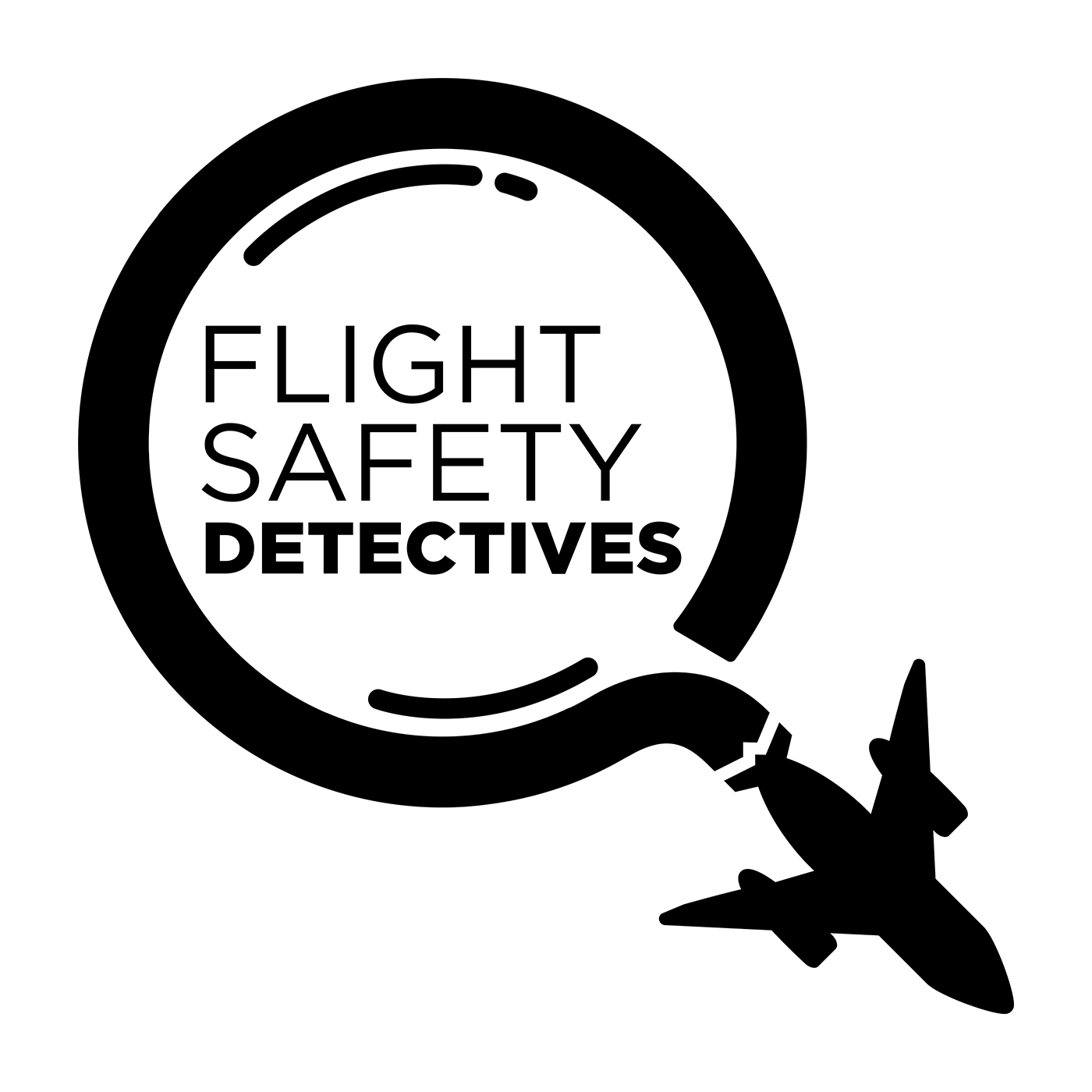
933.4K
Downloads
188
Episodes
World-renowned aviation-industry consultants and former NTSB investigators John Goglia and Greg Feith have 100 years of worldwide aviation safety experience between them. In this hard-hitting podcast series they talk about everything aviation -- from the behind-the-scenes facts on deadly air crashes to topics of interest such as tips and tricks for navigating through airports and security, traveling with infants and children, unruly passengers, and packing your bags to ease through security.
World-renowned aviation-industry consultants and former NTSB investigators John Goglia and Greg Feith have 100 years of worldwide aviation safety experience between them. In this hard-hitting podcast series they talk about everything aviation -- from the behind-the-scenes facts on deadly air crashes to topics of interest such as tips and tricks for navigating through airports and security, traveling with infants and children, unruly passengers, and packing your bags to ease through security.
Episodes
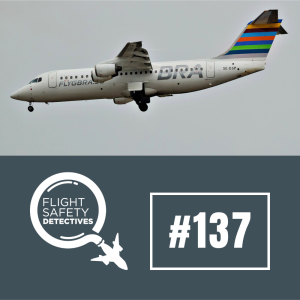
Thursday Oct 20, 2022
Swedish Accident Reveals Stall Sensor Lessons
Thursday Oct 20, 2022
Thursday Oct 20, 2022
Episode 137
The investigation of an issue involving a RJ100 in Sweden is relevant to everyone who flies sophisticated aircraft. Specifically, this investigation revealed issues related to the high angle of attack stall sensor that is commonly used in the aviation industry.
The Swedish authority that investigated the issue deployed a multi-person team. They were able to identify the maintenance errors that led to a false stall warning in flight.
John notes that the stick shake stall warning is the same event that started both 737 Max crashes, as well as an Air France A340 crash. These are just part of a long history of airplane stalls resulting in loss of aircraft and lives. In this case, the plane landed safely.
The final accident report has detail that can help prevent these types of accidents. John and Todd highlight the key findings for pilots and maintenance personnel.
Related documents are available at the Flight Safety Detectives website.
Don’t miss what’s to come from the Flight Safety Detectives - subscribe to the Flight Safety Detectives YouTube channel, listen at your favorite podcast service and visit the Flight Safety Detectives website.
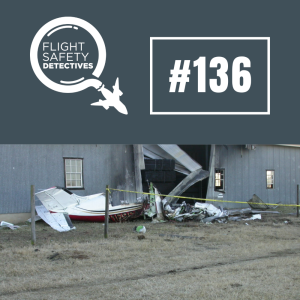
Wednesday Oct 12, 2022
Sick Airplane or Pilot Incompetence?
Wednesday Oct 12, 2022
Wednesday Oct 12, 2022
Episode 136
Was the fatal crash of a Piper PA46-500TP airplane the result of a plane with unresolved maintenance issues or a pilot with insufficient skills? The Flight Safety Detectives find that the NTSB report of this accident has no educational value or safety benefit.
Calling the single engine turbo-prop plane “not your father’s 172,” Greg brings to light the complexities of the aircraft involved. “When things go bad, they go bad very quickly.”
Todd adds his research on social media that indicates the pilot was uncomfortable with the plane. He notes that the pilot needed an unusually high number of hours to earn his instrument rating.
John covers the maintenance records. He wonders if the “no action taken” conclusion of the last work order was because the pilot declined repairs or if the root cause was believed to be the pilot’s inability to fly the aircraft.
The Flight Safety Detectives look at the NTSB report and available information to offer safety insights. They point to poor pilot skills and aeronautical decision making as important factors.
Accident details:
- NTSB Accident Number: DFW08FA057
- Public Docket: https://data.ntsb.gov/Docket?ProjectID=67401
- NTSB Final Report (PDF available at flightsafetydetectives.com)
- NTSB Witness Statement (PDF available at flightsafetydetectives.com)
Don’t miss what’s to come from the Flight Safety Detectives - subscribe to the Flight Safety Detectives YouTube channel, listen at your favorite podcast service and visit the Flight Safety Detectives website.

Wednesday Oct 05, 2022
Mechanical Malfunction Suspected in Recent Cessna 182G Crash
Wednesday Oct 05, 2022
Wednesday Oct 05, 2022
Episode 135
The investigation into a June 2022 Cessna 182G crash in Texas is ongoing. The Flight Safety Detectives share initial facts and offer safety insights.
“A mechanical malfunction is high on my list to look at. Anything out of place, even a simple cotter pin, could have led to problems,” says John.
The detectives share the indications that there was loss of flight controls in the final stages of the flight. They share facts they have uncovered. Listen as they apply their experience to ask questions that the investigation should explore.
Weather conditions, possible mechanical issues, pilot experience, and more factors are explored. Hear what should be done to get beyond a superficial probable cause conclusion in this fatal air crash.
Accident details:
- NTSB Accident Number: CEN22FA232
- Preliminary Kathryn’s Report (PDF available at https://flightsafetydetectives.com/wp-content/uploads/2022/10/kathrynsreport.pdf)
Don’t miss what’s to come from the Flight safety Detectives - subscribe to the Flight Safety Detectives YouTube channel, listen at your favorite podcast service and visit the Flight Safety Detectives website.
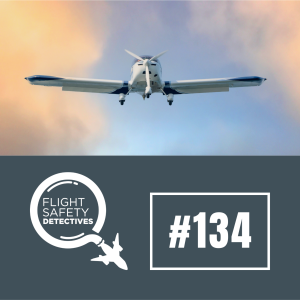
Wednesday Sep 28, 2022
Poor Aeronautical Decision-Making Causes Piper Crash
Wednesday Sep 28, 2022
Wednesday Sep 28, 2022
Episode 134
Poor decision-making by the pilot is showcased in the examination of a Piper PA-24 crash in Angel Fire, New Mexico. The Flight Safety Detectives find that the NTSB report of this air crash provides helpful information and findings that every pilot can learn from.
Greg, John and Todd review the facts, conditions and circumstances of the accident to amplify the role of the pilot’s decisions before and during the flight. A lack of preparation led to this crash and two fatalities.
The pilot was not prepared for the gusty winds present at takeoff. He was also not familiar with the high-density altitude conditions common during hot weather at this airport. Todd estimates the pilot had about 45 seconds between realizing something was wrong and hitting the ground.
For links related to this episode, visit flightsafetydetectives.com
Don’t miss what’s to come from the Flight safety Detectives - subscribe to the Flight Safety Detectives YouTube channel, listen at your favorite podcast service and visit the Flight Safety Detectives website.

Wednesday Sep 21, 2022
Human Factors Ignored on the Maintenance Floor
Wednesday Sep 21, 2022
Wednesday Sep 21, 2022
Episode 133
An accident involving a Hughes 269C helicopter demonstrates the lack of depth in accidents attributed to maintenance errors. Once again, there is no analysis on the human factors involved among maintenance personnel.
The NTSB probable cause for this air crash points to an improperly installed mounting bracket on the engine. The supporting details and aviation insights are lacking.
“My frustration is that they go no further than to say this is a maintenance issue,” John Goglia says. “No human factors are explored although that is as important in maintenance as it is in the cockpit.”
John, Greg and Todd find many questions unanswered. They discuss the value in going deeper than “maintenance screwed up.”
They explore the many questions not investigated that could lead to information that people can learn from. They talk about why even the most benign accidents can result in aviation safety benefits. This accident report is among many that are a disservice to the aviation community because it is superficial.
Also in this episode, Greg retracts a Episode 131 statement that 50% of NTSB probably causes are wrong. He does not have sufficient documentation to support the statement. However, he stands by his statement that he is confident that at least half of NTSB reports are incomplete.
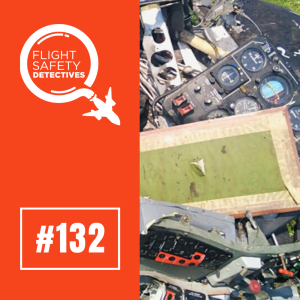
Wednesday Sep 14, 2022
The FAA AC that Could Save Your Life
Wednesday Sep 14, 2022
Wednesday Sep 14, 2022
Episode 132
FAA Advisory Circular 60-22 just may save your life. The document looks at aeronautical decision making and five hazardous attitudes.
In the cockpit, on the hangar floor and in life, the Flight Safety Detectives say this information provides critical insight for everyone in aviation.
Greg, John and Todd use a Cirrus SR 22 air crash in Midland, Texas to illustrate how poor decision-making puts pilots and passengers at risk. Hear as they make the case for everyone in aviation to apply this insight to their work and life.
Pilots who don’t recognize their own limitations and rationalize poor decisions cause accidents. This free document can save your life.

Wednesday Sep 07, 2022
Worthless NTSB Report Adds to Faulty Safety Data
Wednesday Sep 07, 2022
Wednesday Sep 07, 2022
Episode 131
Continuing the discussion started in Episode 128, the deficiencies of the NTSB report of a plane crash in Palo Alto are laid out. John, Greg, and Todd conclude that the report actually contributes to the problem of inaccurate data leading to time and money being spent on the wrong aviation safety issues.
Estimates are that more than 50 percent of NTSB reports are inaccurate, incorrect or outright wrong. This report is highlighted as a case in point.
Greg outlines several questions not answered – or incorrectly addressed – in the report. Here are just a few:
- The departure clearance provided calls to turn right after takeoff, but the pilot turned left. Why?
- Both engines were working. Why was the aircraft so low following takeoff?
- Why did the NTSB spend so much time looking at the engines and no time looking at instrumentation?
“There are many issues with open questions that are not answered,” Greg says. “This is not a beneficial report to understand the cause or contributing factors.”
Todd adds that the media coverage of the air crash characterized the pilot as experienced and dedicated to safe operations. Yet, the NTSB did not look into what would lead him to make the errors apparent that day.
Listen to find out why the Flight Safety Detectives think this report does a disservice to the pilot, other victims and aviation safety overall.
Don’t miss what’s to come from the Flight safety Detectives - subscribe to the Flight Safety Detectives YouTube channel, listen at your favorite podcast service and visit the Flight Safety Detectives website.
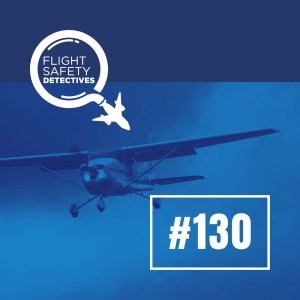
Wednesday Aug 31, 2022
How to Get Information on Aircraft Incidents
Wednesday Aug 31, 2022
Wednesday Aug 31, 2022
Episode 130
Ever wonder how to get details on aviation accidents? You may be surprised to learn that many incidents don’t get added to the NTSB online database.
The Flight Safety Detectives share how they find aviation incident information, from basic Google searches to Freedom of Information Act (FOIA) requests.
“Most people don’t realize that many accidents are investigated by the FAA, not the NTSB,” John says. “And there are many databases out there that can have information.”
The example of wing strike incident with a rental aircraft used by Todd is used to show the steps that can be taken to get information.
John and Todd encourage anyone with interest in a particular incident or aviation in general to explore the information available. Knowledge is power and is the basis for the aviation safety improvements.
The episode also covers the many career opportunities related to aviation, in the air and on the ground.
Don’t miss what’s to come from the Flight safety Detectives - subscribe to the Flight Safety Detectives YouTube channel, listen at your favorite podcast service and visit the Flight Safety Detectives website.

Wednesday Aug 24, 2022
Tips for Today’s General Aviation Pilots
Wednesday Aug 24, 2022
Wednesday Aug 24, 2022
Episode 129
A look at the broad community of support available to today’s general aviation pilots. Todd is discovering rich resources that are helpful to every pilot as he returns to the cockpit after many years.
“Flight instructors are a wealth of knowledge, but pilots still need more,” says Todd.
He and John discuss several important resources:
- Aviation-specific weather available 24/7/365, forecast and up-to-the-minute
- YouTube videos that provide education on large and small topics
- Updated regulations online
Todd also shares resources he has used to prepare for the various qualification exams. He explains his strategies for getting the most of these resources.
They also discuss the value of Freedom of Information Act Requests – now easy to do online – to learn about specific incidents. Todd shares what he has learned from recent requests.
Don’t miss what’s to come from the Flight safety Detectives - subscribe to the Flight Safety Detectives YouTube channel, listen at your favorite podcast service and visit the Flight Safety Detectives website.
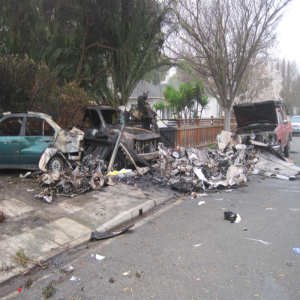
Wednesday Aug 17, 2022
Cessna 310R Air Crash Report Highlights and Failures
Wednesday Aug 17, 2022
Wednesday Aug 17, 2022
Episode 128
The NTSB report of a 2010 Cessna 310R air crash in Palo Alto, California gets mixed reviews. Todd’s impressed by a sound study used to recreate the flight path, and John finds lots of detail in the examination of the wreckage, engine and prop. The positive first impression falls apart when Greg highlights missing details.
The report does not answer many questions, including:
- Appropriateness of unusual air traffic control instructions to “take off at your own risk”
- Why the pilot turned left rather than right shortly after takeoff
- How 200 knot speed was achieved just 14 seconds after takeoff
The “ridiculous” probable cause statement relies on the obvious and doesn’t reflect the facts documented in the report.
The Flight Safety Detectives raise questions that need to be answered to find the aviation safety lessons to be learned from this accident. They raise questions about this aircraft crash that will continued to be explored in the next episode.
Don’t miss what’s to come from the Flight safety Detectives - subscribe to the Flight Safety Detectives YouTube channel, listen at your favorite podcast service and visit the Flight Safety Detectives website.
